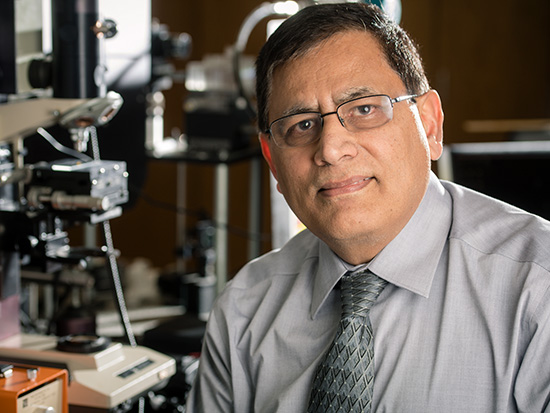Media contact: Savannah Koplon
 Photography: Steve WoodYogesh Vohra, Ph.D., associate dean in the University of Alabama at Birmingham College of Arts and Sciences and professor university scholar in the Department of Physics, has been awarded a three-year, $540,000 grant from the United States Department of Energy’s National Nuclear Security Administration as part of the department’s Stewardship Science Academic Alliances Program.
Photography: Steve WoodYogesh Vohra, Ph.D., associate dean in the University of Alabama at Birmingham College of Arts and Sciences and professor university scholar in the Department of Physics, has been awarded a three-year, $540,000 grant from the United States Department of Energy’s National Nuclear Security Administration as part of the department’s Stewardship Science Academic Alliances Program.
Vohra’s grant is one of 36 awards totaling $21 million allocated to supporting research activities in areas of physical sciences and engineering. The goal of the grants is to provide opportunities for scientific collaboration between the academic community and scientists at the national labs.
“Our laboratory has enjoyed long-term support from the National Nuclear Security Administration, and this allows our research group to study a variety of materials under extreme conditions and explore new materials systems for applicability in the national nuclear security arena,” Vohra said. “One of the most important aspects of this grant is the ability to prepare the next generation of Ph.D.-level scientists to undertake research and development work in programmatic areas critical to our national security, and I look forward to working with these students in this capacity moving forward.”
Vohra will use the grant to further his project, High-Pressure High-Temperature Synthesis and Thermal Equation of State of Materials for Hypersonic Applications. Under this grant, UAB researchers will be synthesizing materials under high pressures and high temperatures and studying their oxidation resistance at elevated temperatures. The materials synthesized under high pressures and high temperatures include high-entropy transition metal borides and boron-rich compounds. Vohra and his team’s overall goal is to understand the basic degradation mechanisms and design materials that can withstand thermal shock, have resistance to oxidation and have high strength to function under extreme conditions encountered during hypersonic flight.
The grant provides support for a physics Ph.D. student and a postdoctoral scholar to work alongside Vohra to develop novel materials for hypersonic applications. This grant provides training opportunities for the graduate student and postdoctoral scholar at National Nuclear Security Laboratories like Los Alamos National Laboratory, Sandia National Laboratories and Lawrence Livermore National Laboratory.
